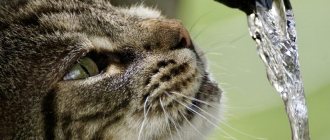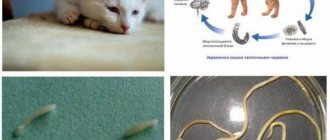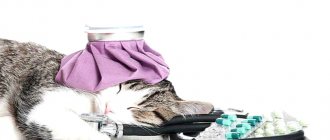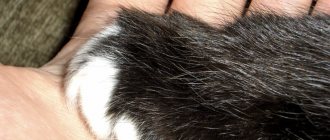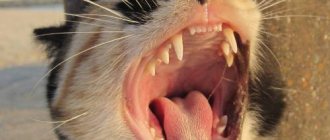Sneezing is a natural physiological process that allows you to clear your nose of foreign bodies (dust, pollen, etc.). It could also be a reaction to a strong odor. If the cat feels well - plays, eats - and the sneezing was a one-time event, then in this case there is no need to sound the alarm.
And it happens that a cat sneezes often, with discharge from the nose. Murkoshi specialists draw your attention to the fact that such sneezing can accompany infectious diseases, including those dangerous to humans. Let's figure out in what cases a cat sneezes and what to do about it.
1) Causes of sneezing
2) When should you consult a doctor?
3) Pet treatment
4) Prevention of sneezing
Causes of sneezing
The reasons that make a cat sneeze may be as follows:
Foreign bodies. Any speck, fluff, or even an insect can get into a cat’s nasal passage, because almost all cats are curious creatures. And each of the objects that gets into the nose can cause sneezing, accompanied by normal mucous discharge.
Colds. They occur for various reasons: hypothermia, draft, poor nutrition (leads to decreased immunity). When a kitten begins to sneeze due to a cold, “sniffles” and tears flow along with it, a cough appears, and the temperature rises.
Read more: Treatment of colds in cats
Allergy. Allergic reactions in cats are caused by many substances - perfumes, pollen, tobacco smoke, dust, air fresheners. Along with sneezing, there may be watery eyes, a rash on the skin, and mucus discharge from the nose.
Read more about allergies: Symptoms and treatment of allergies in cats
Infectious diseases. They can be caused by a virus, fungus or bacteria - these are diseases such as chlamydia, rhinotracheitis, cryptococcosis and others. Common symptoms of these diseases are: cough, fever, red eyes, decreased appetite and nasal discharge (possibly with pus).
Helminths. The presence of worms can also cause an animal to sneeze. In this case, cough, lacrimation, nausea, weight loss, and dulling of the coat are also observed.
Read about it: Worms in cats: symptoms and treatment
Asthma. The pet coughs, sneezes, the mucous membranes turn pale, hoarse breathing is heard, gasps for air, and becomes lethargic.
Oncology. Occurs rarely in cats. This serious illness usually occurs in adult cats. European shorthair cat breeds are also at risk. Delayed treatment can lead to the death of the pet. With cancer, a cat sneezes blood, tears flow from its eyes, and bumps appear on its face. If left untreated, the purr loses a lot of weight, loses appetite and suffers from seizures.
What to do if your cat sneezes
You can find out what to do if your cat sneezes from your veterinarian at your appointment. First of all, the doctor will determine the cause that provoked frequent sneezing.
If this is an allergic reaction, anti-allergic drugs are prescribed and, most importantly, the source of the allergy is eliminated (by elimination).
If there is a viral infection, the veterinarian will prescribe anti-inflammatory drugs and antibiotics.
In order to protect your pet as much as possible from all kinds of diseases, it must be vaccinated.
Vaccination is usually carried out at the age of six months and further on the recommendation of a doctor. It is always easier to prevent a disease than to treat it.
Prices for appointments in our network of veterinary clinics
| Name of veterinary services | Unit | Price, rub |
| ⭐ Initial appointment | 1 animal | 400 |
| ⭐ Repeated appointment | 1 animal | 250 |
| Initial appointment with a specialist | 1 animal | 1100 |
| Consultation without an animal | — | 550 |
| Consultation with a doctor based on test results | 1 PC. | 400 |
| Weighing animals | 1 animal | For free |
| Additional fixation for aggressive animal behavior | 1 animal | 700 |
All our Veterinary Clinics:
For any suggestions regarding the site: [email protected]
|






